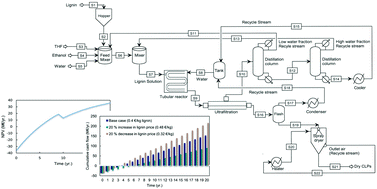当前位置:
X-MOL 学术
›
Green Chem.
›
论文详情
Our official English website, www.x-mol.net, welcomes your
feedback! (Note: you will need to create a separate account there.)
Techno-economic assessment for the large-scale production of colloidal lignin particles
Green Chemistry ( IF 9.3 ) Pub Date : 2018-10-02 , DOI: 10.1039/c8gc02805b Rahul Prasad Bangalore Ashok 1, 2, 3, 4 , Pekka Oinas 1, 2, 3, 4 , Kalle Lintinen 2, 3, 4, 5 , Golam Sarwar 1, 2, 3, 4 , Mauri A. Kostiainen 2, 3, 4, 5 , Monika Österberg 2, 3, 4, 5
Green Chemistry ( IF 9.3 ) Pub Date : 2018-10-02 , DOI: 10.1039/c8gc02805b Rahul Prasad Bangalore Ashok 1, 2, 3, 4 , Pekka Oinas 1, 2, 3, 4 , Kalle Lintinen 2, 3, 4, 5 , Golam Sarwar 1, 2, 3, 4 , Mauri A. Kostiainen 2, 3, 4, 5 , Monika Österberg 2, 3, 4, 5
Affiliation

|
The purpose of this study is to investigate the techno-economic feasibility of an environmentally sustainable and green process for the cost-effective large-scale manufacturing of colloidal lignin particles. The process involves the instantaneous formation of colloidal lignin particles (CLPs) through self-assembly when a concentrated solution of lignin in tetrahydrofuran (THF) and ethanol is introduced into water. The capacity of the plant is assumed to be 50 kt per year of dry colloidal lignin and Aspen plus simulation program is used for the mass and energy balance calculations. The process equipment design and pricing are carried out based on relevant literature and vendor data. Results show that the total investment cost for a plant integrated with an existing pulp mill or bio-refinery is 36 M€ and the annual operating cost is 46 M€. The project lifetime is assumed as 20 years and the cost of production of colloidal lignin is found to be 0.99 € kg−1 (in case of integration) and 1.59 € kg−1 (without integration). The revenue for the process comes mainly from selling the colloidal lignin particles and additional revenue is generated from high pressure and low-pressure steam condensate sold as district heat. The payback period with a CLP selling price of 1.10 € kg−1 is found to be roughly 5 years. A minimum profitability requirement of 10% is considered for the techno-economic analysis and the internal rate of return (IRR) is calculated as 17% making the process viable and profitable. In addition, a sensitivity analysis is carried out to evaluate the effect of raw material price and ethanol recovery on the operating cost. Colloidal lignin has the potential to compete favorably as a renewable replacement for petroleum based feedstock like polyethylene, polypropylene, polyethylene terephthalate (PET) and phenol and can be used in attractive applications like phenol formaldehyde (PF) resins, foams, carbon fillers, bactericides and composites.
中文翻译:

大规模生产胶体木质素颗粒的技术经济评估
这项研究的目的是研究一种经济上可持续的绿色工艺的技术经济可行性,以进行具有成本效益的大规模生产胶体木质素颗粒。当将木质素在四氢呋喃(THF)和乙醇中的浓缩溶液引入水中时,该过程涉及通过自组装瞬时形成胶体木质素颗粒(CLP)。假定工厂的生产能力为每年50 kt的干燥胶体木质素,并且使用Aspen plus模拟程序进行质量和能量平衡计算。过程设备的设计和定价是根据相关文献和供应商数据进行的。结果表明,与现有制浆厂或生物精炼厂整合的工厂的总投资成本为3600万欧元,年运营成本为4600万欧元。-1(如果集成)和1.59€kg -1(不集成)。该过程的收入主要来自出售胶体木质素颗粒,另外的收入来自作为区域供热的高压和低压蒸汽冷凝水。CLP售价为1.10€kg -1的投资回收期被发现大约是5年。技术经济分析考虑的最低获利能力要求为10%,内部收益率(IRR)计算为17%,从而使流程可行且有利可图。此外,还进行了敏感性分析,以评估原材料价格和乙醇回收率对运营成本的影响。胶体木质素有潜力作为可再生替代品来替代石油基原料,例如聚乙烯,聚丙烯,聚对苯二甲酸乙二酯(PET)和苯酚,可用于有吸引力的应用中,例如苯酚甲醛(PF)树脂,泡沫,碳填料,杀菌剂和复合材料。
更新日期:2018-10-30
中文翻译:

大规模生产胶体木质素颗粒的技术经济评估
这项研究的目的是研究一种经济上可持续的绿色工艺的技术经济可行性,以进行具有成本效益的大规模生产胶体木质素颗粒。当将木质素在四氢呋喃(THF)和乙醇中的浓缩溶液引入水中时,该过程涉及通过自组装瞬时形成胶体木质素颗粒(CLP)。假定工厂的生产能力为每年50 kt的干燥胶体木质素,并且使用Aspen plus模拟程序进行质量和能量平衡计算。过程设备的设计和定价是根据相关文献和供应商数据进行的。结果表明,与现有制浆厂或生物精炼厂整合的工厂的总投资成本为3600万欧元,年运营成本为4600万欧元。-1(如果集成)和1.59€kg -1(不集成)。该过程的收入主要来自出售胶体木质素颗粒,另外的收入来自作为区域供热的高压和低压蒸汽冷凝水。CLP售价为1.10€kg -1的投资回收期被发现大约是5年。技术经济分析考虑的最低获利能力要求为10%,内部收益率(IRR)计算为17%,从而使流程可行且有利可图。此外,还进行了敏感性分析,以评估原材料价格和乙醇回收率对运营成本的影响。胶体木质素有潜力作为可再生替代品来替代石油基原料,例如聚乙烯,聚丙烯,聚对苯二甲酸乙二酯(PET)和苯酚,可用于有吸引力的应用中,例如苯酚甲醛(PF)树脂,泡沫,碳填料,杀菌剂和复合材料。











































 京公网安备 11010802027423号
京公网安备 11010802027423号